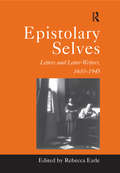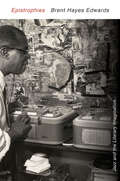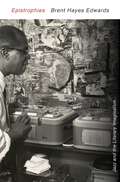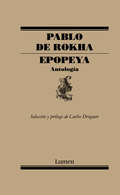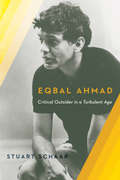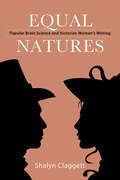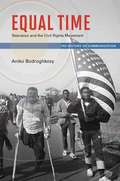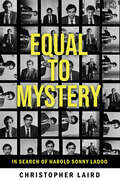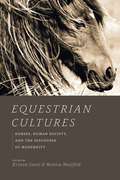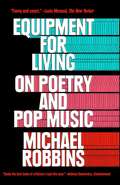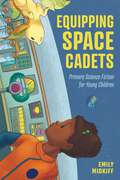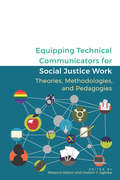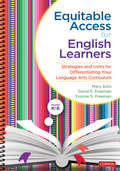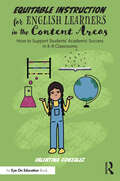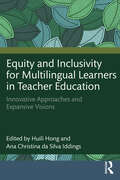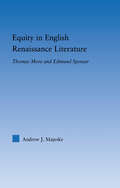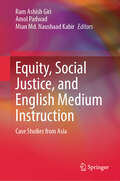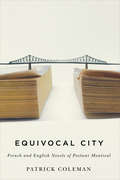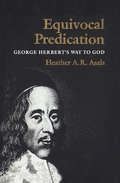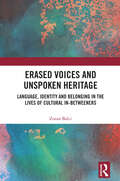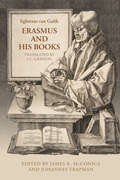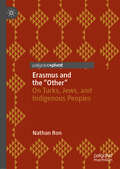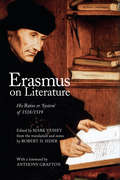- Table View
- List View
Epistolary Selves: Letters and Letter-Writers, 1600–1945 (Warwick Studies in the Humanities #No. 4)
by Rebecca EarleThis volume of ten essays discusses the pivotal role that letters have played in social, economic and political history from the seventeenth to the twentieth century. The recent scholarly interest in the history of reading has as yet yielded few studies which consider letters as a category of readable material. The contributors to this book seek to redress this oversight, viewing letters as texts which can reveal information, not only about their writers and readers, but about the wider historical context in which they were written. Topics covered include the mercantile letter, diplomatic correspondence, and what these epistolary forms suggest about the rise of a polite, literate culture in the eighteenth century; the experience of immigration from Europe to America during the nineteenth and twentieth centuries; the relationship through the letter; and the working of gender in the epistolary form. Rebecca Earle provides an overview of how the study of letter-writing can open up new avenues of historical as well as literary investigation. This, together with contributions form leading international scholars, makes Epistolary Selves an essential text for those researching the letter genre.
Epistrophies: Jazz And The Literary Imagination
by Brent Hayes EdwardsHearing across media is the source of innovation in a uniquely African American sphere of art-making and performance, Brent Hayes Edwards writes. He explores this fertile interface through case studies in jazz literature—both writings informed by music and the surprisingly large body of writing by jazz musicians themselves.
Epistrophies: Jazz and the Literary Imagination
by Brent Hayes EdwardsHearing across media is the source of innovation in a uniquely African American sphere of art-making and performance, Brent Hayes Edwards writes. He explores this fertile interface through case studies in jazz literature—both writings informed by music and the surprisingly large body of writing by jazz musicians themselves.
Epopeya: Antología
by Pablo De RokhaRescate de la gran antología prologada que Carlos Droguett hizo de la poesía de Pablo de Rokha. Epopeya es la recuperación de un grandioso hito de la poesía chilena. En 1974, Carlos Droguett publicó en La Habana una amplia selección prologada de la obra de Pablo de Rokha, quien seis años antes se había quitado la vida. Además de la amistad, los unía una afinidad literaria marcada por el ímpetu, el desborde y la acritud. Fue inmejorable el trabajo de Droguett, hecho para la prestigiosa colección Casa de las Américas de Cuba y hoy reeditado íntegramente por Lumen Poesía: una antología sustancial y maciza antecedida de una extensa introducción que realza con inteligencia el valor de la gran poesía rokhiana, esa escritura única, celebratoria y demoledora a la vez.
Eqbal Ahmad: Critical Outsider in a Turbulent Age
by Stuart SchaarEqbal Ahmad (1930?–1999) was a bold and original activist, journalist, and theorist who brought uncommon perspective to the rise of militant Islam, the conflict in Kashmir, the involvement of the United States in Vietnam, and the geopolitics of the Cold War. A long-time friend and intellectual collaborator of Ahmad, Stuart Schaar presents in this book previously unseen materials by and about his colleague, having traveled through the United States, India, Pakistan, western Europe, and North Africa to connect Ahmad's experiences to the major currents of modern history.Ahmad was the first to recognize that former ally Osama bin Laden would turn against the United States. He anticipated the rapidly shifting loyalties of terrorists and understood that overthrowing Saddam Hussein would provoke violence and sectarian strife in Iraq. Ahmad had great compassion for the victims of the proxy wars waged by the leading Cold War powers, and he frequently championed unpopular causes, such as the need to extend the rights of Palestinians and protect Bosnians and Kosovars in a disintegrating Yugoslavia. Toward the end of his life, Ahmad worked tirelessly to broker a peace between India and Pakistan and to prevent the spread of nuclear weapons throughout the subcontinent. As novel and necessary as ever, Ahmad's remarkable vision is here preserved and extended to reveal the extent to which he was involved in the political and historical conflicts of his time.
Equal Natures: Popular Brain Science and Victorian Women's Writing (SUNY series, Studies in the Long Nineteenth Century)
by Shalyn ClaggettIn Equal Natures, Shalyn Claggett argues that Victorian women writers used scientific understandings of the brain to challenge socially constructed forms of power and gender inequality. Focusing on phrenology—the first science of brain localization and the most popular science in nineteenth-century Britain—Claggett shows how these writers leveraged phrenology's premise that the seat of identity is innate rather than acquired to make new claims about women's intellectual abilities and psychological complexity. Whereas male scientists often used phrenology to support racist and colonialist agendas, in the hands of women, an appeal to biology became a tool of subversion. Through historically contextualized analyses of works by Charlotte and Anne Brontë, Harriet Martineau, Mary Elizabeth Braddon, and George Eliot, Equal Natures demonstrates how biology was used to contest conventional understandings of individual identity and interpersonal relations. In doing so, it counters a dominant assumption in feminist theory that essentialism has been the exclusive province of patriarchal values and reactionary political aims.
Equal Time: Television and the Civil Rights Movement
by Aniko BodroghkozyEqual Time: Television and the Civil Rights Movement explores the crucial role of network television in reconfiguring new attitudes in race relations during the civil rights movement. Due to widespread coverage, the civil rights revolution quickly became the United States' first televised major domestic news story. This important medium unmistakably influenced the ongoing movement for African American empowerment, desegregation, and equality. Aniko Bodroghkozy brings to the foreground network news treatment of now-famous civil rights events including the 1965 Selma voting rights campaign, integration riots at the University of Mississippi, and the March on Washington, including Martin Luther King's "I Have a Dream" speech. She also examines the most high-profile and controversial television series of the era to feature African American actors--East Side/West Side, Julia, and Good Times--to reveal how entertainment programmers sought to represent a rapidly shifting consensus on what "blackness" and "whiteness" meant and how they now fit together.
Equal to Mystery: In Search of Harold Sonny Ladoo
by Christopher LairdWhen, as the editor of a Trinidadian literary journal in the radical years of the early 1970s, Christopher Laird was sent Harold Sonny Ladoo's novel, No Pain Like This Body (1973) to review, he knew he was looking at something revolutionary in Caribbean fiction. It is a novel that has recently been republished as a Penguin Modern Classic. But the next news Laird heard of Ladoo was that he had returned to Trinidad from Canada and had been found dead – very probably murdered – in the canefields outside his family's village of McBean. A posthumous novel followed, Yesterdays, a rawer and less artistically shaped novel that combined broad satire of the Canadian Christian missions in Trinidad with an unwavering look at the sometimes sordid nature of peasant village life. For Laird, it became an obsession to try to discover the writer behind these novels and what had brought about his untimely end. Equal to Mystery – words written by Ladoo – is the record of that pursuit. Laird discovers, for instance, that Ladoo's public version of his biography bore only a tangential relationship to the truth, that his inventiveness as a writer extended to the management of his persona.
Equestrian Cultures: Horses, Human Society, and the Discourse of Modernity (Animal Lives)
by Monica Mattfeld Kristen GuestAs much as dogs, cats, or any domestic animal, horses exemplify the vast range of human-animal interactions. Horses have long been deployed to help with a variety of human activities—from racing and riding to police work, farming, warfare, and therapy—and have figured heavily in the history of natural sciences, social sciences, and the humanities. Most accounts of the equine-human relationship, however, fail to address the last few centuries of Western history, focusing instead on pre-1700 interactions. Equestrian Cultures fills in the gap, telling the story of how prominently horses continue to figure in our lives, up to the present day. Kristen Guest and Monica Mattfeld place the modern period front and center in this collection, illuminating the largely untold story of how the horse has responded to the accelerated pace of modernity. The book’s contributors explore equine cultures across the globe, drawing from numerous interdisciplinary sources to show how horses have unexpectedly influenced such distinctively modern fields as photography, anthropology, and feminist theory. Equestrian Cultures boldly steps forward to redefine our view of the most recent developments in our long history of equine partnership and sets the course for future examinations of this still-strong bond.
Equipment for Living: On Poetry and Pop Music
by Michael RobbinsBrilliant, illuminating criticism from a superstar poet—a refreshing, insightful look at how works of art, specifically poetry and popular music, can serve as essential tools for living.How can art help us make sense—or nonsense—of the world? If wrong life cannot be lived rightly, as Theodor Adorno had it, what weapons and strategies for living wrongly can art provide? With the same intelligence that animates his poetry, Michael Robbins addresses this weighty question while contemplating the idea of how strange it is that we need art at all. Ranging from Prince to Def Leppard, Lucille Clifton to Frederick Seidel, Robbins’s mastery of poetry and popular music shines in Equipment for Living. He has a singular ability to illustrate points with seemingly disparate examples (Friedrich Kittler and Taylor Swift, to W.B. Yeats and Anna Kendrick’s “Cups”). Robbins weaves a discussion on poet Juliana Spahr with the different subsets of Scandinavian black metal, illuminating subjects in ways that few scholars can achieve. Equipment for Living is also a wonderful guide to essential poetry and popular music.
Equipping Space Cadets: Primary Science Fiction for Young Children (Children's Literature Association Series)
by Emily MidkiffWinner of the 2023 Science Fiction Research Association (SFRA) Book Award2022 Longlist Nominee for the Best Non-Fiction Award from the British Science Fiction AssociationEquipping Space Cadets: Primary Science Fiction for Young Children argues for the benefits and potential of “primary science fiction,” or science fiction for children under twelve years old. Science fiction for children is often disregarded due to common misconceptions of childhood. When children are culturally portrayed as natural and simple, they seem like a poor audience for the complex scientific questions brought up by the best science fiction. The books and the children who read them tell another story. Using three empirical studies and over 350 children’s books including If I Had a Robot Dog, Bugs in Space, and Commander Toad in Space, Equipping Space Cadets presents interdisciplinary evidence that science fiction and children are compatible after all. Primary science fiction literature includes many high-quality books that cleverly utilize the features of children’s literature formats in order to fit large science fiction questions into small packages. In the best of these books, authors make science fiction questions accessible and relevant to children of various reading levels and from diverse backgrounds and identities. Equipping Space Cadets does not stop with literary analysis, but also presents the voices of real children and practitioners. The book features three studies: a survey of teachers and librarians, quantitative analysis of lending records from school libraries across the United States, and coded read-aloud sessions with elementary school students. The results reveal how children are interested in and capable of reading science fiction, but it is the adults, including the most well-intentioned librarians and teachers, who hinder children's engagement with the genre due to their own preconceptions about the genre and children.
Equipping Technical Communicators for Social Justice Work: Theories, Methodologies, and Pedagogies
by Godwin Y. Agboka Rebecca WaltonEquipping Technical Communicators for Social Justice Work provides action-focused resources and tools—heuristics, methodologies, and theories—for scholars to enact social justice. These resources support the work of scholars and practitioners in conducting research and teaching classes in socially just ways. Each chapter identifies a tool, highlights its relevance to technical communication, and explains how and why it can prepare technical communication scholars for socially just work. For the field of technical and professional communication to maintain its commitment to this work, how social justice intersects with inclusivity through UX, technological, civic, and legal literacies, as well as through community engagement, must be acknowledged. Equipping Technical Communicators for Social Justice Work will be of significance to established scholar-teachers and graduate students, as well as to newcomers to the field. Contributors: Kehinde Alonge, Alison Cardinal, Erin Brock Carlson, Oriana Gilson, Laura Gonzales, Keith Grant-Davie, Angela Haas, Mark Hannah, Kimberly Harper, Sarah Beth Hopton, Natasha Jones, Isidore Kafui Dorpenyo, Liz Lane, Emily Legg, Nicole Lowman, Kristen Moore, Emma Rose, Fernando Sanchez, Jennifer Sano-Franchini, Adam Strantz, Cana Uluak Itchuaqiyaq, Josephine Walwema, Miriam Williams, Han Yu
Equitable Access for English Learners, Grades K-6: Strategies and Units for Differentiating Your Language Arts Curriculum
by Yvonne S. Freeman David E. Freeman Mary SotoPlain and simple: until our English learners have equitable access to the curriculum, they’ll continue to struggle with subject area content. And if you’re relying on add-on’s to fit in from your language arts basal or a supplementary program, Mary Soto, David Freeman, and Yvonne Freeman are here to equip you with much more effective, efficient, and engaging strategies for helping your English learners read and write at grade level. One assurance right from the start: Mary, David, and Yvonne are not suggesting you reinvent your curriculum. Instead, Equitable Access for English Learners, Grades K-6, focuses on how to fortify foundational practices already in place. First, you’ll learn more about the Equitable Access Approach, then it’s time to dive into the book’s four units of study. Drawing on each unit’s many strategies, you’ll discover how to apply them to any unit in your own language arts curriculum and start differentiating: How to draft and implement language objectives to help English learners meet academic content standards How to make instructional input comprehensible, including translanguaging strategies that draw on your students’ first languages when you don’t know how to speak them How to utilize the characteristics of text to support readers, along with a rubric for determining a text’s cultural relevance How to build students’ academic content knowledge and develop academic language proficiency Each unit addresses a commonly taught topic in today’s language arts programs and comes with ready-to-go review and preview activities, key strategies, grade-level adaptations, reflection exercises, and printable online resources. Taken as a whole, they constitute an all-new approach for providing that equitable and excellent access our English learners so rightfully deserve. "When you adopt our Equitable Access Approach, your students will not only thrive, they’ll also find your language arts curriculum much more meaningful and engaging." —Mary Soto, David E. Freeman, and Yvonne S. Freeman
Equitable Access for English Learners, Grades K-6: Strategies and Units for Differentiating Your Language Arts Curriculum
by Yvonne S. Freeman David E. Freeman Mary SotoPlain and simple: until our English learners have equitable access to the curriculum, they’ll continue to struggle with subject area content. And if you’re relying on add-on’s to fit in from your language arts basal or a supplementary program, Mary Soto, David Freeman, and Yvonne Freeman are here to equip you with much more effective, efficient, and engaging strategies for helping your English learners read and write at grade level. One assurance right from the start: Mary, David, and Yvonne are not suggesting you reinvent your curriculum. Instead, Equitable Access for English Learners, Grades K-6, focuses on how to fortify foundational practices already in place. First, you’ll learn more about the Equitable Access Approach, then it’s time to dive into the book’s four units of study. Drawing on each unit’s many strategies, you’ll discover how to apply them to any unit in your own language arts curriculum and start differentiating: How to draft and implement language objectives to help English learners meet academic content standards How to make instructional input comprehensible, including translanguaging strategies that draw on your students’ first languages when you don’t know how to speak them How to utilize the characteristics of text to support readers, along with a rubric for determining a text’s cultural relevance How to build students’ academic content knowledge and develop academic language proficiency Each unit addresses a commonly taught topic in today’s language arts programs and comes with ready-to-go review and preview activities, key strategies, grade-level adaptations, reflection exercises, and printable online resources. Taken as a whole, they constitute an all-new approach for providing that equitable and excellent access our English learners so rightfully deserve. "When you adopt our Equitable Access Approach, your students will not only thrive, they’ll also find your language arts curriculum much more meaningful and engaging." —Mary Soto, David E. Freeman, and Yvonne S. Freeman
Equitable Instruction for English Learners in the Content Areas: How to Support Students’ Academic Success in K-8 Classrooms
by Valentina GonzalezIn Equitable Instruction for English Learners in the Content Areas, ESL expert Valentina Gonzalez shows you how to meet the needs of English learners in K-8 classrooms. With an emphasis on comprehensible input, the clear and accessible guidance in this book allows teachers to maintain a high level of instruction and hold all students to high standards while allowing English learners important opportunities to engage with key content area language and excel at subject-specific material. Demonstrating how equity is an essential component to teaching multilingual learners, this book includes engaging practical strategies catered to different grade levels, and it is essential reading for every teacher who works with multilingual learners.
Equity and Inclusivity for Multilingual Learners in Teacher Education: Innovative Approaches and Expansive Visions
by Huili Hong Ana Christina da Silva IddingsThis textbook equips pre-service educators with the tools they need to empower multilingual learners, their families, and communities; promote educational equity; and advocate for the rights of multilingual learners in increasingly complex sociopolitical settings. Featuring contributions from researchers, in-service teachers, pre-service teachers, and community leaders, the book offers expansive and diverse perspectives on the challenges and solutions related to multilingual learners in a myriad of educational contexts and environments. The book goes beyond traditional classroom strategies to cultivate all participants’ active agency and incorporate advocacy for both teachers and multilingual learner students, exploring the intricate connections between praxis and community engagement in a comprehensive way. Addressing a wide array of increasingly common challenges, this thoughtful resource is ideal for undergraduate and graduate students in teacher education and educational leadership preparation programs, as well as teacher researchers and school administrators.
Equity in English Renaissance Literature: Thomas More and Edmund Spenser (Literary Criticism and Cultural Theory)
by Andrew MajeskeThis book accounts for the previously inadequately explained transformation in the meaning of equity in sixteenth century England, a transformation which, intriguingly, first comes to light in literary texts rather than political or legal treatises. The book address the two principal literary works in which the transformation becomes apparent, Thomas More's Utopia and Edmund Spenser's Faerie Queene, and sketches the history of equity to its roots in the Greek concept of epieikeia, uncovering along the way both previously unexplained distinctions, and a long-obscured esoteric meaning. These rediscoveries, when brought to bear upon the Utopia and Faerie Queene, illuminate critical though relatively neglected textual passages that have long puzzled scholars.
Equity, Social Justice, and English Medium Instruction: Case Studies from Asia
by Ram Ashish Giri Mian Md. Naushaad Kabir Amol PadwadThis book contributes to the existing body of knowledge on English Medium Instruction's (EMI) role in equity and social justice and adds to the ongoing conversation by providing the Asian perspective to it. It showcases scholarly works by scholars and researchers in the field and presents their diverse voices on EMI and social justice in a single volume. This book focuses on different aspects of the issue on EMI, equity, and social justice in different Asian contexts while providing a holistic picture of social justice in English language teaching in the region. It focuses on the current context-specific EMI practices situating them in their historical pretext, employs prevalent theoretical as well as methodological models and approaches to study such practices, considers curricular and pedagogical considerations adapted to address the multitude of needs of EMI, and examines controversies surrounding the conceptualization, plan/policy, and implementation strategies of EMI.
Equivocal City: French and English Novels of Postwar Montreal
by Patrick ColemanThe study of Montreal as a specific location in French and English writings has long been subordinated to the demands of linguistically divided and politically contentious narratives about national development. In this cross-linguistic study, Patrick Coleman models an inclusive and post-national literary history of the city itself. Tracing a sequence of moments in the emergence of the Montreal novel from World War II to the turbulent 1960s, Equivocal City offers close readings of fourteen key works of fiction, focusing on the inner dynamic of their construction as well as the unexpected convergences and contrasts in the narrative structures they adopt and the aesthetic perspective they seek to achieve. Critically sophisticated but accessibly written, this book gives a sympathetic account of how writers in both languages struggled to give integrated artistic expression to their experience of a city that was still linguistically compartmentalized and culturally insecure. By analyzing the interplay between story and narrative form, the book explores what French and English novelists could – and could not – imagine about the Montreal they sought to portray. From the responsible realism of Hugh MacLennan and Gabrielle Roy to the fractious phantasmagorias of Jacques Ferron and Leonard Cohen, Equivocal City traces the evolution of the Montreal novel with the aim of retrieving a shareable literary past.
Equivocal Prediction: George Herbert's Way to God
by Heather A. R. RossEquivocation replaced Thomistic analogy as a means of predicting God in the minds of many seventeenth-century divines. In this study, Professor Asals analyses George Herbert's use of language as a method of devotion in his major cycle poem, The Temple. Tracing the logical notion of equivocation (here the extensive us of puns and pun-like verbal devices) as prediction through other influences on his poetry, she argues that the very basis of Herbert's work lies in its responsibility in predicting God as One and Love. Asals explains that, for Herbert, the act of writing a poem--the actual handwriting--was a sacramental and ceremonial act of worship recreating Christ's death on the cross: ink becomes blood. The sign on the printed page points sacramentally to the blood it signifies. Thus, the domain of Herbert's poetry reaches from earth to heaven and from heaven to earth. Continuing with an examination of Herbert's language, including aspects of phonology, morphology, and syntax, Asals reveals its two-fold significance in expression and meaning. Through a detailed reading of the entire corpus, she investigates the profound influence of Augustinianism and Wisdom literature on the way poetry works and explores the meaning of gesture and its importance to Herbert's Anglicanism--his belief in the importance of ceremony. In the final chapter, on the topos of Magdalene, its relationship to Herbert's mother, and his mother's importance to his writing, Asals argues that Anglicanism as a way to God (and God as a way to himself) is at the very core of Herbert's poetics. This book establishes a new critical milieu in which Herbert may be interpreted and sheds new light on the poetry of other writers of the period.
Erased Voices and Unspoken Heritage: Language, Identity and Belonging in the Lives of Cultural In-betweeners
by Zozan BalciIn a world where cultural identity is often defined by national borders, this book follows the compelling journeys of young adults caught between preserving the culture and language of their migrant parents and navigating societal pressures to fit into the country in which they were born. Through intimate “walk-and-talk” interviews, the book gives voice to young adults who reflect on their experiences growing up with multiple languages and cultures. These personal stories offer a rich exploration of language, place, and belonging that resonates with anyone familiar with the struggle to reconcile different worlds.The book provides an insight into their multifaceted lives, inviting readers into the intimate spaces where personal identity meets societal expectation. The book challenges conventional paradigms of cultural conformity and examines how these young adults define themselves beyond simplistic labels. Erased Voices and Unspoken Heritage offers fresh perspectives on why some second-generation migrants embrace, reject, or negotiate their heritage languages. It also critiques the harmful consequences of “passing” within homogenous constructs and highlights the broader implications for diversity, hybridity, and multilingualism. This thought-provoking book will appeal to anyone interested in the complexities of identity, race, and language in multicultural societies.
Erasmus and His Books (Erasmus Studies)
by J. C. Grayson Egbertus Van Gulik James K. McConica J. TrapmanWhat became of Erasmus’ books? The most famous scholar of his day died in peaceful prosperity and in the company of celebrated and responsible friends. His zeal for useful books was insatiable. Indeed, he had taken care to insure that after his death they would pass to an appreciative noble owner, yet after his death their fate was unknown. Erasmus and His Books provides the most comprehensive evidence available about the books of Erasmus of Rotterdam – the books he owned and his attitude towards them, when and how he acquired them, how he housed, used, and cared for them, and how, from time to time, he disposed of them. Part 1 details the formation, growth, scope, and arrangement of Erasmus’ library and opens the door to a new understanding of the more intimate side of his daily life as a scholar at home with his books, friends, publishers, and booksellers. Part 2 presents a carefully annotated catalogue, the Versandliste, of the more than 400 books in Erasmus’ possession at one point. Drawing upon his command of bibliographical data and his extensive knowledge of Erasmus’ correspondence and related records Egbertus van Gulik proposes as precise an identification of each of the titles as the evidence will allow. Van Gulik’s insightful discoveries tell us what can be known of books in Erasmus’ working library and how he used them and will be of interest to students of the northern Renaissance, the history of the book, and the history of learning.
Erasmus and Voltaire
by Ricardo J. QuinonesDespite comparisons between Erasmus and Voltaire having become common-place in the course of the nineteenth century, this is the first full study to bring them together in their careers, their works, and their historic afterlives. Each was a force for change in his time and thus ranks among the masters of modern liberalism. Beginning with the continuities between the Renaissance and the Enlightenment, award-winning scholar Ricardo J. Quinones joins Erasmus and Voltaire as voices of moderation and reason that remain capable of addressing the philosophical crises of twentieth-century thought.A companion piece to Dualisms, Quinones' 2007 book, Erasmus and Voltaire differs in method: where its predecessor looked to inveterate, unyielding differences, this new work looks to similarities. In delving beneath the obvious differences between these two intellectual giants, Quinones uncovers the great practical and spiritual vocations that unite them.
Erasmus and the “Other”: On Turks, Jews, and Indigenous Peoples
by Nathan RonThis book investigates how Erasmus viewed non-Christians and different races, including Muslims, Jews, the indigenous people of the Americas, and Africans. Nathan Ron argues that Erasmus was devoted to Christian Eurocentrism and not as tolerant as he is often portrayed. Erasmus’ thought is situated vis-à-vis the thought of contemporaries such as the cosmographer and humanist Aeneas Sylvius Piccolomini who became Pope Pius II; the philosopher, scholar, and Cardinal, Nicholas of Cusa; and the Dominican missionary and famous defender of the Native Americans, Bartolomé Las Casas. Additionally, the relatively moderate attitude toward Islam which was demonstrated by Michael Servetus, Sebastian Franck, and Sebastian Castellio is analyzed in comparison with Erasmus’ harsh attitude toward Islam/Turks.
Erasmus on Literature: His Ratio or ‘System’ of 1518/1519 (Erasmus Studies)
by Robert D. SiderNone of the works included among Erasmus’ ‘Literary and Educational Writings’ in the Collected Works of Erasmus captures his most adventurous thinking about how texts signify in – and thereby make or remake – worlds of thought, feeling, and action. The one that comes closest to doing so, the Ratio verae theologiae (‘A System of True Theology’), was first published separately in 1518 and 1519, then appeared in the preliminaries to the New Testament in Erasmus’ (revised) 1519 edition. This handy Ratio or compendious ‘System’ gave advice on how to interpret complex texts and develop persuasive arguments based upon them. Its lessons were applied to the canonical Scriptures as source, and to everyday Christian theology as target discourse. They unfold in response to the special difficulties and incitements of the biblical text in Latin and Greek, within a framework provided by classical grammar and rhetoric, adjusted to the examples of the Church Fathers as exemplary interpreters of the Bible. At every turn, the Ratio reveals the instincts and intuitions of an exceptional theorist and practitioner of the cognitive, social, and political arts of written language. This student edition, the first of its kind in any language, is based on the translation and notes by Robert D. Sider in the Collected Works of Erasmus Volume 41 . It is designed to make it easier to estimate the long-term value of this particular work and of Erasmus’ works more generally, and to allow for a multidisciplinary understanding of the lives of human beings as symbol-using creatures in worlds constructed partly by texts.
